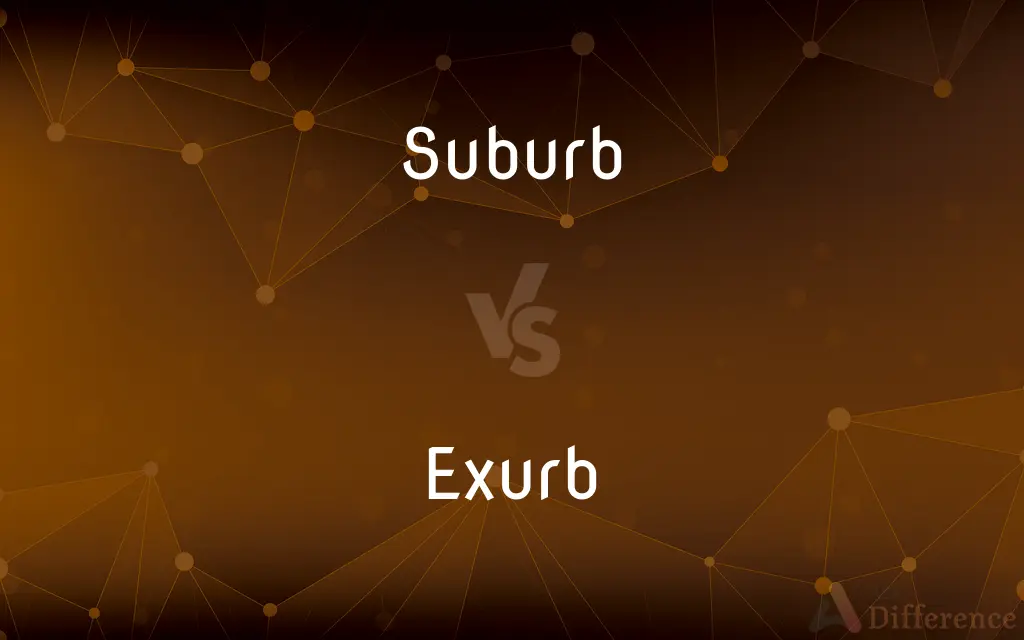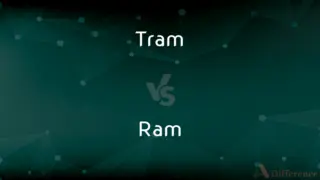Suburb vs. Exurb — What's the Difference?
Edited by Tayyaba Rehman — By Urooj Arif — Updated on April 8, 2024
Suburbs are residential areas on the outskirts of cities, offering a balance between urban and peaceful living, while exurbs are further out, providing more space and a quieter lifestyle but with longer commutes.

Difference Between Suburb and Exurb
Table of Contents
ADVERTISEMENT
Key Differences
Suburbs are typically located near major cities and offer a mix of residential, commercial, and sometimes industrial zones. They provide a balance for those looking to live near urban centers but prefer a more tranquil and spacious environment. Exurbs, on the other hand, are situated even further from the city center, often beyond the suburbs, and are characterized by more spacious living environments, lower population density, and a stronger emphasis on residential use.
While suburbs are well-connected to urban centers via major highways and public transportation, facilitating easier commutes for residents who work in the city, exurbs may lack in public transportation options and require longer commute times. The increased distance from city centers often means that exurb residents rely more heavily on personal vehicles for transportation.
Suburbs offer a variety of amenities such as shopping centers, schools, and parks, making them attractive for families and individuals seeking a balance between urban conveniences and residential comfort. Exurbs, while offering larger lots and more open space, might not have the same level of accessibility to these amenities, requiring residents to travel greater distances for shopping, education, and recreation.
The housing in suburbs is often a mix of single-family homes, townhouses, and apartments, reflecting a diversity of living options to accommodate different preferences and income levels. In contrast, exurbs tend to have predominantly single-family homes, often on larger plots of land, reflecting the desire for more space and privacy.
Community life in suburbs is typically more vibrant due to the higher population density and availability of local amenities and events. Exurbs, with their lower population density and greater distances between homes, might offer a quieter, more isolated living experience, which can be a draw for those seeking solitude or a closer connection to nature.
ADVERTISEMENT
Comparison Chart
Location
Close to urban centers, on the outskirts.
Further from urban centers, beyond suburbs.
Population Density
Higher, with a mix of residential types.
Lower, predominantly single-family homes.
Amenities
Varied amenities including schools, parks.
Fewer amenities, requiring longer commutes.
Transportation
Better public transport and road connections.
More dependent on personal vehicles.
Living Environment
Balanced urban conveniences and tranquility.
More space and privacy, closer to nature.
Compare with Definitions
Suburb
Suburbs often have their own local amenities like schools and shopping centers.
Maple Grove suburb is known for its extensive shopping district and community schools.
Exurb
An area located further from the city than suburbs, often characterized by more space and tranquility.
The exurb of Pinecrest features large, secluded homes surrounded by nature.
Suburb
A residential area located on the outskirts of a city, often with diverse housing options.
The suburb of Oak Park offers a variety of homes, from historic single-family houses to modern apartments.
Exurb
Exurbs usually have lower population density and are predominantly residential.
Rolling Hills exurb is known for its spacious lots and quiet streets.
Suburb
Housing in suburbs can range from affordable to upscale, accommodating a wide range of incomes.
The suburb of Lakeside offers housing options from luxury estates to starter homes.
Exurb
Exurbs offer a closer connection to nature and more privacy, appealing to those seeking solitude.
The exurb of Forest Ridge is popular among those who value privacy and outdoor activities.
Suburb
Many suburbs are characterized by a strong sense of community and local events.
The annual summer festival in the suburb of Greenfield brings the community together.
Exurb
The lack of local amenities in exurbs means residents may travel to nearby towns for shopping and services.
Residents of Meadowview exurb often drive to the neighboring suburb for groceries and entertainment.
Suburb
Suburbs provide a balance between access to urban jobs and a quieter living environment.
Residents of the suburb of Elmwood enjoy short commutes to the city while living in a peaceful neighborhood.
Exurb
Living in an exurb often requires a longer commute to urban centers, affecting daily travel.
Commuting from the exurb of Valley View to the city takes over an hour by car.
Suburb
A suburb (or suburban area or suburbia) is a mixed-use or residential area, existing either as part of a city/urban area, or as a separate residential community within commuting distance of one. Suburbs might have their own political or legal jurisdiction, especially in the United States, but this is not always the case, especially in the United Kingdom where most suburbs are located within the administrative boundaries of cities.
Exurb
An exurb (alternately: exurban area) is an area outside the typically denser inner suburban area of a metropolitan area, which has an economic and commuting connection to the metro area, low housing density, and growth. It shapes an interface between urban and rural landscapes holding an urban nature for its functional, economic, and social interaction with the urban center, due to its dominant residential character.
Suburb
An outlying district of a city, especially a residential one
A highly respectable suburb of Chicago
A working-class suburb
Life is much better in the suburbs
Exurb
A semirural region lying just beyond the suburbs of a city.
Suburb
A usually residential area or community outlying a city.
Exurb
A residential area beyond the suburbs.
Suburb
Suburbs The usually residential region around a major city; the environs.
Suburb
A residential area located on the outskirts of a city or large town that usually includes businesses that cater to its residents; such as schools, grocery stores, shopping centers, restaurants, convenience stores, etc.
Suburb
(by extension) The outer part; the environment.
Suburb
Any subdivision of a conurbation, not necessarily on the periphery.
Suburb
An outlying part of a city or town; a smaller place immediately adjacent to a city; in the plural, the region which is on the confines of any city or large town; as, a house stands in the suburbs; a garden situated in the suburbs of Paris.
[London] could hardly have contained less than thirty or forty thousand souls within its walls; and the suburbs were very populous.
Suburb
Hence, the confines; the outer part; the environment.
The suburb of their straw-built citadel.
Suburb
A residential district located on the outskirts of a city
Common Curiosities
How do schools in exurbs compare to those in suburbs?
Schools in exurbs might serve a wider area with potentially fewer resources than suburban schools, which are often supported by larger community populations.
What distinguishes a suburb from an exurb?
The main difference is their proximity to urban centers; suburbs are closer, while exurbs are further out and more isolated.
Do people living in exurbs usually work in the city?
Some do, but the longer commute means that many exurb residents might work locally or have flexible work arrangements.
Is public transportation available in exurbs?
Exurbs generally have limited public transportation options compared to suburbs, with residents relying more on personal vehicles.
How do housing styles differ between suburbs and exurbs?
Suburbs feature a mix of housing types, while exurbs tend to have single-family homes on larger lots.
Can exurbs have amenities similar to suburbs?
While possible, exurbs typically have fewer amenities than suburbs, focusing more on residential space and nature.
What factors should one consider when choosing between living in a suburb and an exurb?
Considerations include commute time, desire for amenities and community interaction, preference for privacy and space, and the value placed on a connection to nature.
What type of lifestyle do exurbs offer?
Exurbs offer a quieter, more isolated lifestyle with a closer connection to nature, appealing to those seeking solitude or space.
Are exurbs always located beyond suburbs?
Yes, exurbs are typically situated beyond the suburbs, offering a more rural living environment.
Are exurbs more expensive than suburbs?
It depends on the location and the size of the property, but exurbs can offer more land, potentially at a higher price due to the desire for space and privacy.
How do property taxes compare between suburbs and exurbs?
Property taxes can vary widely, but suburbs often have higher taxes due to better services and schools, while exurbs may have lower taxes but fewer services.
Are there any health benefits associated with living in exurbs over suburbs?
Living in exurbs might offer health benefits related to lower pollution levels, reduced stress from a quieter environment, and greater opportunities for outdoor activities.
What are the environmental impacts of living in suburbs vs. exurbs?
Suburbs may contribute to sprawl and higher energy use due to commuting, while exurbs, with their larger properties and possibly undeveloped land, can impact natural habitats but might also offer opportunities for conservation.
How does the community atmosphere differ between suburbs and exurbs?
Suburbs often have a denser, more active community life with organized events and amenities, whereas exurbs, with their lower density, tend to have a quieter, more individualistic lifestyle.
Share Your Discovery

Previous Comparison
Tram vs. Ram
Next Comparison
Oscar vs. EmmyAuthor Spotlight
Written by
Urooj ArifUrooj is a skilled content writer at Ask Difference, known for her exceptional ability to simplify complex topics into engaging and informative content. With a passion for research and a flair for clear, concise writing, she consistently delivers articles that resonate with our diverse audience.
Edited by
Tayyaba RehmanTayyaba Rehman is a distinguished writer, currently serving as a primary contributor to askdifference.com. As a researcher in semantics and etymology, Tayyaba's passion for the complexity of languages and their distinctions has found a perfect home on the platform. Tayyaba delves into the intricacies of language, distinguishing between commonly confused words and phrases, thereby providing clarity for readers worldwide.














































